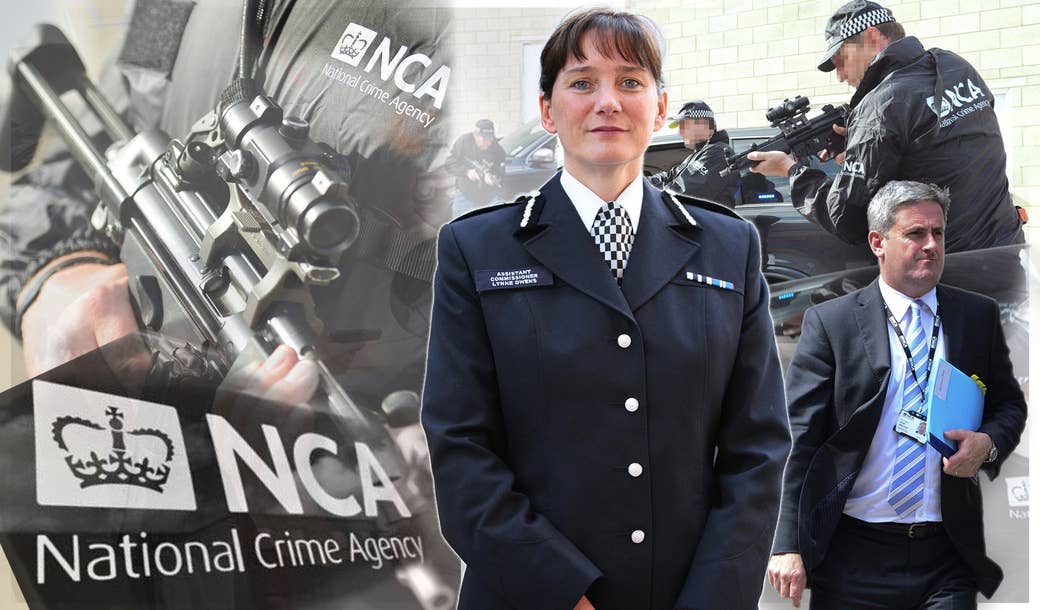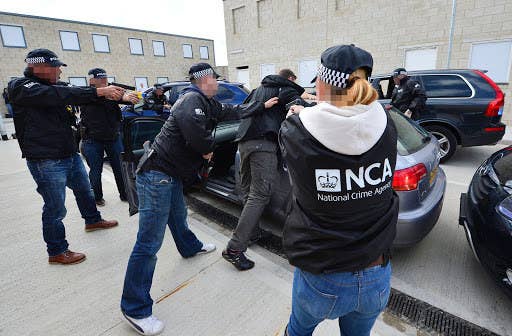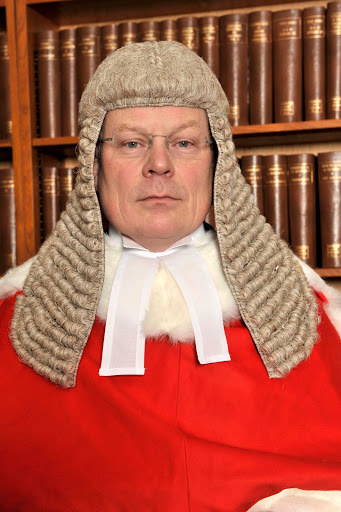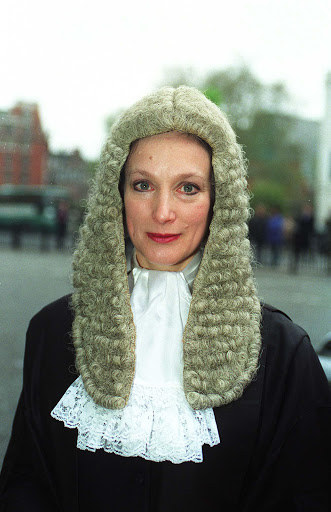
Britain’s elite crime-fighting agency has admitted it may have been searching properties and seizing evidence unlawfully for almost a decade because of glaring “systemic” failings in the way it applies for legal permission to conduct its operations.
Every single one of the National Crime Agency’s (NCA’s) live investigations and prosecutions are in jeopardy after it launched a sweeping internal inquiry into all its warrants and production orders over fears they may have been obtained unlawfully.
BuzzFeed News can reveal that the NCA has admitted to judges it used evidence that may have been gathered unlawfully in four major cases – three of which have collapsed at a cost of millions of pounds to the taxpayer. One of those judges has confirmed that the agency’s use of potentially unlawful warrants – obtained without disclosing all the relevant information to the courts – is “systemic” and will inevitably rebound on other major cases.
The NCA and the Crown Prosecution Service (CPS) are now investigating every type of authorisation that “Britain’s FBI” has received to raid homes, seize property, and collect telephone and banking records.
The agency said the systemic failings were a “training issue” that it “inherited” from its predecessor, the Serious Organised Crime Agency (SOCA), which was founded in 2006 – raising fears the unlawful raids may date back almost 10 years. Lawyers have warned that past convictions may be unsafe and some of Britain’s most dangerous criminals – including murderers, child abusers, organised-crime kingpins, and major drug dealers – may have to be set free.
An investigation by BuzzFeed News has uncovered the full scale of the crisis engulfing the NCA, which was set up amid fanfare by home secretary Theresa May in 2013. It reveals that:
CPS barristers admitted in court that the NCA raided the premises of suspects and seized evidence including phones and computers without proper warrants in three major money-laundering cases that collapsed because of the agency’s failings.
The agency has been ordered to pay £10,000 by the Investigatory Powers Tribunal (IPT) for failing to comply with a court order in relation to one of the money-laundering cases that collapsed after agents raided the suspects’ property without proper warrants and installed surveillance devices to spy on them.
The conviction of one of Britain’s most prolific drug traffickers may be at risk after the NCA confessed to an Old Bailey judge that the warrants used to raid his Chelsea safe house and seize £2.5 million of cocaine were potentially unlawful.
The CPS and the NCA have launched a major investigation into the impact of the failings on live cases, but refused to say how many prosecutions could be affected and said historical convictions would be left unchecked.
Judge Wendy Joseph QC, the Old Bailey justice who presided over three of the trials blighted by the NCA’s use of unlawful warrants, warned in a letter to BuzzFeed News that “there must, by virtue of the systemic nature of the problem, be other cases” that could be undermined by the same failings. Mr Justice Hickinbottom, who presided over another of the NCA’s botched cases, decried the agency’s “egregious disregard for constitutional safeguards”.
The NCA has admitted in court that agents tasked with applying for its warrants and production orders were not properly trained and routinely submitted the paperwork without seeking any legal advice. In some cases, agents were found to have failed to disclose relevant information to courts about the nature of their operations when asking for permission to search properties, seize evidence, and install bugs – rendering the authorisation they received unlawful.
Kier Monteith, a barrister for the defence in two of the collapsed money-laundering trials, said the internal inquiries “create the perfect storm” for the NCA. “The ramifications for defendants past, present and future are immense,” he said, adding that the convictions in danger of being quashed could reach "double figures".

The revelations that the NCA has engaged in unlawful search and surveillance will heap further pressure on May as she battles fierce opposition to her draft investigatory powers bill – dubbed a snoopers’ charter by critics – which would allow the “bulk interception” of web data by the authorities.
The home secretary promised the NCA would take a “wholly new approach to the fight against organised crime” – albeit on a dramatically reduced budget – when it was established to replace the scandal-hit SOCA two years ago. But she has already been buffeted by a series of major embarrassments over the new agency’s failings. Her national crimefighters were forced to apologise after it emerged they had taken more than a year to pass information from the Canadian authorities about prolific British paedophiles to local police forces. Then a humiliating official inspection report found that “very few officers could routinely access the internet from their desktop computers” because the equipment they had inherited from SOCA was so “poor”. And the agency’s leadership is in disarray after Keith Bristow, the director, became the seventh senior figure to resign in a matter of months this summer.
Lynne Owens, the chief constable of Surrey police, was named on Thursday as the new director of the agency, making her the most senior woman in British law enforcement. She arrives as the NCA is facing its most devastating scandal yet after admitting to BuzzFeed News that its own failings have put its investigations at risk.
A spokeswoman for the NCA told BuzzFeed News that the discovery that many of its warrants were unlawful was “a disappointment to us and prompted a comprehensive review across the agency of inherited processes and standards around warrant applications”. She said the review of “all warrants, production orders, account monitoring orders, and authorisations for searches ... in all live cases” was “a substantial task and will go on for some time”. But, she said, “We consider that it is the right thing to do.”
Keith Vaz MP, chair of the influential home affairs select committee, said the revelations by BuzzFeed News were "astonishing" and declared that he intended to grill Bristow over the failings when the outgoing director appears before MPs in 10 days.
"The prospect of hundreds of hours of time having been wasted by experienced NCA officers, and criminals avoiding prosecution because of a failure to follow legal processes is deeply concerning," Vaz said.
Today, BuzzFeed News can reveal the astonishing story of how the agency set up to take on the country’s toughest criminals found itself floundering because of its own failings.

On a crisp winter morning in January, 30 unmarked cars sped up to an unassuming office in a leafy suburb of west London, spilling 100 black-clad crimefighters onto the forecourt. The officers, from Britain’s top law enforcement agency, were there to swoop on a trio of millionaire brothers – Satish, Jawahar, and Rashmi Chatwani – as part of a major money-laundering investigation.
The new agency had been tasked by the home secretary with the relentless pursuit of Britain’s most serious criminals, and now bosses had devised an audacious plan. They intended to storm in and arrest the three family businessmen, wrongly believed to be kingpins in a organised-crime group laundering vast amounts of dirty money. But the true reason for the raid was not simply to gather evidence, as the magistrates who signed the search, seizure, and arrest warrants had been told. The real plan was to wait until the brothers were safely in detention and the coast was clear, and then install listening devices in their offices. The secret hope was that the “deliberately boisterous” arrests would cause enough alarm to “provoke” the three men into discussing the crimes they had been wrongly accused of when they were eventually released.
The raid went ahead as planned: The Chatwani brothers were led away in handcuffs and the officers seized 500 bags of evidence. But the NCA did not bank on the fact that almost as soon as they were released, the millionaire businessmen would hire a private detective to sweep their offices for bugs.
The agents eavesdropping on their offices panicked when they heard that their listening devices were about to be discovered and scrambled their way back into the office to retrieve them after making another arrest. But by now the whole plan was unravelling.

The brothers applied to the High Court, arguing that the warrants used to raid their premises had been obtained unlawfully the following month. The resulting judgment from Mr Justice Hickinbottom was excoriating. The officers had, he ruled, failed in their legal “duty of candour” when they applied to magistrates for their search and seizure warrants. They had not disclosed sufficient details of the evidence they had in their possession, nor had they given details of the material they hoped to obtain in the searches. The NCA conceded both of these failings before the hearing. The judge also ruled that the NCA had not told the court that the dominant purpose of the raid was to install listening devices and to try to provoke the Chatwanis into talking about the crimes of which they had been wrongly accused.
During the hearing, the NCA’s barristers admitted that “as the new national agency created to combat financial and other organised crime”, the agency had been “deliberately trying to stretch the boundaries imposed upon such investigation agencies by the statutory scheme under which they operate” when it devised its plan to target the Chatwanis. They argued that the NCA was “driven by the ingenuity of criminals ... to employ unconventional and unexpected policing methods”.
Regardless, the judge denounced the NCA for its “grave” errors, “ignorance”, and “egregious disregard for constitutional safeguards”. And – alarmingly – he warned that the procedural problems he had identified were far from being a one-off. The agency’s procedures were so systematically flawed by a lack of training and a failure to seek any legal advice that it would be “almost inevitable” that the resulting warrants were “grossly deficient”.
The Chatwanis later made an application to the Investigatory Powers Tribunal, which presides over cases of state surveillance, to challenge the planting of bugs in their office and the use of the material obtained. The IPT found that the NCA had asked surveillance commissioners for permission to install the devices but had not disclosed all the relevant facts. The agency had not revealed that it planned to plant the bugs after arresting the Chatwanis in a deliberate attempt to provoke them. If that plan had worked and the brothers had been spurred into discussing the alleged conspiracy after their release, the conversations caught on tape would almost certainly have involved discussions with lawyers. Eavesdropping on that would have infringed the sacrosanct principle that legal advice is confidential. Had the surveillance commissioners been given the full picture, the tribunal concluded, the warrants would not have been granted on the same basis.
In effect, the NCA had failed to give the full picture to either the magistrates who approved their warrants to search the premises, seize evidence, and arrest the Chatwanis, or the surveillance commissioners who granted them permission to install the bugs. As a consequence the entire operation had been conducted unlawfully.
To make matters worse, the NCA repeatedly failed to comply with an order by the tribunal to disclose to the Chatwanis the names of any people and organisations with whom it had shared the surveillance material unlawfully gathered from their offices. The IPT was so incensed by the failure to follow its directions that it ordered the NCA to pay£10,000 to the Chatwanis – the first time it has ever made such an award – and said the “persistent breaches” were “not conduct expected of a reputable agency”. The NCA has since paid the costs and says it is complying with the order.
The Chatwani debacle was a devastating blow for Theresa May’s national crimefighters. The case collapsed in its entirety and the agency apologised to the Chatwanis last month. The brothers are now suing for damages of £13 million – in part because they say a major business deal fell through following the raid. Their claim, seen by BuzzFeed News, alleges they were unlawfully imprisoned by the NCA on a pretext to plant surveillance bugs and that their handcuffing constitutes assault and battery.
In the aftermath, the agency commissioned a massive internal inquiry and its lawyers began working alongside the CPS to review every warrant it has obtained in all its live cases. But despite the dire problems uncovered by the Chatwani case, there have been no public announcements about the existence of the inquiry.
Satish Chatwani told BuzzFeed News: “This inquiry is news to me – which is surprising given I assume it arises as a direct result of our case,” he said. “Legislation exists to protect individuals and business from excessive and wrongful intrusion ... All other innocent individuals, like us, should be compensated if their warrants are similarly found to be defective. It is the only way to restore public confidence in this wayward agency.”
The lawyers charged with digging through hundreds of old warrants did not have to look far before they unearthed another time bomb, which this time threatened to blow a hole in one of the agency’s biggest success stories.

In October 2014, the NCA scored a major hit by securing the conviction of the prolific drug trafficker Kevin Hanley. Using a fruit and veg business at New Covent Garden Market as a front, Hanley had smuggled £5 million of Venezuelan cocaine into the UK in watermelons and pomegranates. When officers raided his safehouse in Chelsea, they found £2.5 million of cocaine, £200,000 of amphetamines, £61,000 of skunk, more than £2 million in cash, and two cash-counting machines.
The original raids were carried out by SOCA in 2012, prompting Hanley to go on the run. But when the NCA took over the investigation the following year, its agents tracked the drug baron to Greece and snared him in a sting operation at a pub in Athens. Hanley was described at his trial as the “top, top man” in the drug world – exactly the sort of criminal kingpin the NCA had been set up to bring down – and his conviction was a major coup. So the discovery that the search warrants used to seize the evidence that led to his conviction might be faulty would be nothing short of a calamity if it meant he had to be released.
BuzzFeed News can reveal that the NCA has recently told the Old Bailey judge who convicted Hanley, Wendy Joseph QC, that she jailed him on the basis of warrants that “were or may have been obtained unlawfully”. A hearing on the status of the warrants is scheduled for next month and – if they are found to have been unlawful – Hanley could appeal his conviction.
The admission the NCA had to make to Joseph was particularly stinging because she had previously thrown out another of its cases at the Old Bailey and delivered a scathing judgment criticising the agency for its lack of competence.
The previous case was the result of a major money-laundering investigation codenamed Operation Enderby. Seven defendants stood trial at the end of last year, accused of laundering the proceeds of a £40 million fraud against a string of well-known organisations including Care UK, the brewing giant AB InBev, South Essex College, and – bizarrely – Chester Zoo. But the prosecution disintegrated under the weight of a succession of errors by the NCA.
Joseph was so seriously displeased that when she discharged the jury she told them: “Things have gone terribly wrong in this case ... Everyone accepts that with the state of the evidence as it is, half investigated, material missing, material misleading, it is simply impossible to go on with you. Please don’t leave the building thinking this is how cases are normally conducted.”
Now the NCA had found out that – on top of the other errors that had resulted in the case being thrown out – the warrants and production orders it used in Operation Enderby may also have been unlawful. Worse still, there was a second major money-laundering trial coming up off the back of the same investigation that had also been listed to be heard by Joseph – which meant it would potentially have to admit to the already unimpressed judge that it had put unlawful evidence before her in both cases.
The second Enderby trial had already been delayed for several months due to the NCA’s inability to pull its case together on time. When it finally came before Joseph this spring, the agency was forced to admit that the warrants and production orders it had used to search the suspects’ premises and gain access to their phone and bank records were unlawful. The trial collapsed immediately – becoming the third major prosecution to fall apart.
In a highly unusual move, Joseph responded to a letter from BuzzFeed News asking about the collapsed cases to confirm: “You are right in saying the question of unlawful warrants has been raised before me in connection with three trials.” She wrote: “I am aware that the NCA assert that they take their failings very seriously and that they intend to conduct an internal investigation. As to other outstanding cases where similar problems might be arising – there must, by virtue of the systemic nature of the problem, be other cases.”
In addition to the NCA’s own audit, the CPS confirmed that it had launched an inquiry of its own into the disastrous Operation Enderby prosecutions, led by its head of serious and organised crime. A resulting report made a series of recommendations to the NCA for future prosecutions, none of which has been disclosed publicly.
The NCA said it was proud to have a conviction rate of over 90% and said “the nature of the criminals we investigate requires us to be dynamic and assertive in our approach”. It said it did “not want any prosecution to fail” and was “engaging proactively with the defence and working closely with the CPS” in any cases where problems with its warrants were found as part of its review. It was also making applications under section 59 of the Criminal Justice and Police Act 2001 to be allowed to keep evidence obtained with the warrants.
The NCA spokeswoman said the review hadn’t yet found “anything that leads us to believe there is a need to go back over settled cases”.
But Keir Monteith of Garden Court Chambers, who led the defence teams in both trials arising from Operation Enderby, said the ramifications for all the NCA’s cases past and present could be far-reaching. “In each and every one we must question the safety of any convictions and this sad state of affairs will inevitably be hindering important investigations in the short to medium term,” he said. “The fallout is hard to predict but the number of convictions that could be quashed might reach double figures.”
